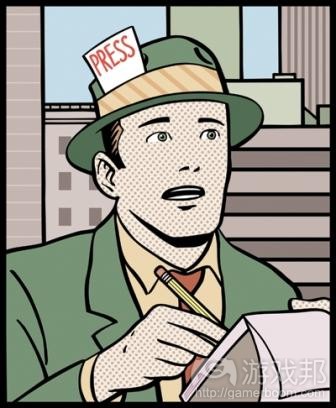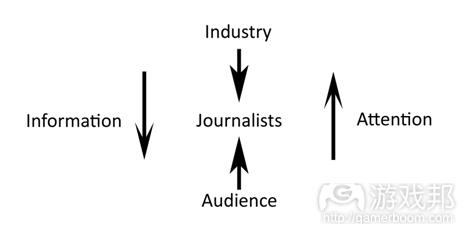游戏媒体和产商在信息流动中保持平衡关系
作者:Ruud Koorevaar
最终他们还是这么做了!《最终幻想14》正在重生中!界面是否发生改变?他们是否找到解决方案来处理千篇一律的环境?他们是否真正解释了何谓levequest?还有最重要的问题,我们能否在游戏中跳跃?
新《最终幻想14》正在内测中。作为游戏记者,你当然有测试新游戏的激活码,也希望看到郁郁葱葱的Eorzea能够得到重大的改善。
你安装了测试客户端,在大量的NDA(游戏邦注:即保密协议)下点击同意,然后登录创建角色!
你所要做的第一件事情是,猛击空格键。没有出现任何变化。你再次尝试,还是没有任何变化。是否按键绑定有所偏差呢?并非如此,游戏人物依然不可跳跃!
接下来你要做的事情就是,大加抱怨他们又做出了一款不能跳跃的游戏,真让人失望!
一两分钟后,桌旁的电话响起,你接起来听到一句话:“你被解雇了。”
NDA和禁令
NDA的内涵不只是那整屏的文字。在电脑游戏中,多数情况下它们所包含的信息是“任何与知识产权相关的信息均属机密,泄漏任何机密信息都要付出代价”。这种代价包括不可再参加内测、被添加至公司的黑名单中甚至你的老板迫于游戏发行商的压力而将你解雇。
NDA关系到法律问题。如果你违反合同或触犯法律,就要对此等行为负责。然而,在“强硬”(游戏邦注:即较为正式的)规定之外,也存在“温和”(游戏邦注:即不正式的)规定,就是所谓的禁令。现在再重新看下以上的例子,将NDA替换成禁令。因上述行为被解雇固然不太可能,但游戏发行商确实会对游戏记者及其所属公司的行为做出回应。比如,记者可能被添加到游戏发行商的黑名单中,不让其了解任何消息。但是,为何游戏发行商要创造出这些正式和非正是的规定并强制执行呢?
为解答这个问题,我将简要剖析其他例子以及与NDA和禁令有关的观点,并指出游戏新闻业本质和这些NDA、禁令对游戏记者做法的影响。
流动平衡
以上虚构的场景显示出有着密切关系的三大主角组成的网络,他们分别是行业(游戏邦注:即游戏产商)、出版商和受众(游戏邦注:即消费者)。这个网络中各个角色的关系如下图所示:
这种模式呈现出行业、记者和受众间的动态关系。其中,关系的焦点在于记者身上。记者可以被看作是位于行业和受众之间的守门人。作为守门人,记者需要决定向用户传播哪些信息,并规划玩家会如何评价得到的这些信息。
在这个模型中,信息和关注度不断流动。这些流动都会通过记者这个环节。比如,我们首先来看信息的流动,发行商有时会直接发布产品信息,而不通过出版商这个环节。其次,对行业和记者来说,关注度的流动是个重要部分,因为这是盈利的直接来源。你能够吸引更多人关注产品或能够利用发布的信息来营造更活跃的氛围,你就可以汇集更高的关注度,而这可以转化成直接或间接的盈利。同时,这也强调了改模型的逆时针循环,反馈系统使得信息的流动产生关注度流动,再次勾起受众和记者的欲望,使二者想要了解更多信息。这就是与供求相关的基本经济概念。
然而,在从产商接收信息并将其公示给用户这期间存在某个灰色区域,记者可以对提交给他们的信息进行处理。这个灰色区域受NDA和禁令的影响。这些强硬或温和的规定能够影响记者的决定,他们是要倾向于灰色区域中的黑色层面接受行业的指令,还是更倾向于白色层面,也就是记者在发布信息时不考虑行业的供求关系,作为独立的新闻媒体只是告知受众相关信息而已(游戏邦注:比如有些记者会想:“我对索尼是否有正面新闻或新闻发布时间对错与否并不关心,我的工作只是尽快并尽量准确地告知读者我所知道的新闻”)。
回头看看上述模型,可以推测这些规定有个代理方,他们能够影响网络以及这个网络中的不同流动,比如能够处理记者在发布商设定的期限到来之前违反禁令发布截图的事情。法国社会学家和哲学家Bruno Latour所确立的成员网络理论进一步阐述了这种与人类代理商相关的非人类代理,以及这些元素是如何组成不断进展的网络。NDA和禁令的代理随后便可用来解析显示在该模型中的网络的影响力。
流动干涸
NDA或禁令对网络影响最大的是从行业到记者的信息流动。当记者不遵从产商设置的规定,产商就会决定切断这个信息流动。这导致信息流动的干涸,最终导致记者的关注度越来越少,因为他们无法提供大量的信息。然而,这个模型也并没有这么简单。这是个平衡的动态模型。三方都处在这种平衡的框架中,最明显的就是游戏产商和记者(游戏邦注:多数情况下,用户需要的只是信息而已,无论来自哪一方)。首先,产商希望同记者维持较好的关系,毕竟记者能够直接提升产品关注度。但是,如果这些记者贸然地发布信息,违反NDA或禁令,这就会破坏产商的运营计划,比如可能会直接影响到产生营造用户最大关注度的营销计划。如果出现这种状况,后者会希望自行控制信息的流动,执行NDA和禁令来实现自己的目标。其次,记者必须选择他们是否愿意根据产商的意愿来保护信息流动,或者冒风险靠发布新信息来获得短期的关注度。
互相依赖
尽管如此,游戏记者和行业之间的关系最终还是互惠互利的。所以,行业和游戏记者双方都必须培养维持这种关系,利用各自的影响力和力量来控制NDA和禁令的灰色区域,在黑白两个层面找到平衡点。如若不然,双方都会遭受损失。(本文为游戏邦/gamerboom.com编译,如需转载请联系:游戏邦)
Publishers vs Press: A Precarious Balancing Act
Ruud Koorevaar
Can we Jump?!
At last! They are doing it! Final Fantasy Online XIV Online is getting a reboot! Was the interface fixed? Did they find a solution for the copy-pasting of the environment? Do they actually give an explanation of what levequests are now? And the question of all questions: can we jump?!
Final Fantasy XIV Online Reboot has hit closed beta. As a renowned games journalist you have been granted a single key to unlock the grand doors to a new and, hopefully, much improved version of the lush lands of Eorzea.
You install the beta-client, click through the necessary wall-of-texts called NDAs, agreed, yes, agreed, log-in, done, create character, go!
The first thing you do: hit spacebar. Nothing. You try again. Still nothing. Is the key binding different? No. Wait, there is still no jump?!
The second thing you do: tweet that they are made up of a bunch of, excuse the French, ass-hats for not implementing jump, again. Frustration!
After a minute or two your bewilderment is broken off by the sound of the phone purring on the table beside you. You reach over and answer, still slightly stricken, “hello?”.
“You’re fired.”
NDAs and Embargos
NDAs, or Non-Disclosure Agreements, are actually more than just walls of text. In relation to computer games they most often contain a message which sounds akin to “any information even remotely related to this intellectual property is confidential and if you spread any confidential information you will pay the price”. This price can range from simply being denied further access to a closed beta, to being added to the black list of a company or to even getting fired by your own employer, possibly as a consequence of pressure from the publisher of the game in question.
NDAs concern matters of legal practices. If you break the contract, you break the law and you can be held accountable. However, besides these ‘hard’ (or formal) agreements there are also ‘soft’ (informal) agreements, called embargos. Now consider the scene sketched above, but replace the NDA with an embargo and the case with revealing a number a screenshots. Getting fired over this would obviously be unlikely, but the possibility of repercussions from the game publisher towards the journalist and the company he is affiliated with can very well be real. The journalist can for example be placed on the black list of the game publisher, resulting in radio silence towards the journalist. But why would game publishers create these formal and informal agreements and enforce them?
To answer this question I will briefly explore further cases, observations and opinions regarding NDAs and embargos and relate these to academic literature concerning the nature of game journalism and the implications these NDAs and embargos have on the practices of game journalists.
The Balance of Flows
The fictional scene illustrated in the introduction displays a number of key relations in the network between the three main actors: the industry (the producers), press and audience (the consumers). A straightforward model to visualize this network is as following:
This model represents a dynamic relation between the industry, journalists and the audience which can both be appropriated from a bottom-up or top-down perspective. However, the focal point is located at the journalists. As such, journalists can be regarded as the gatekeepers who are positioned between the industry and the audience. As gatekeepers the role of the journalists is to determine “what kind of knowledge is passed on to consumers” as well as structure “the ways that gamers are, in turn, able to evaluate that knowledge”.
In this model there is a flow of information and attention, or ‘eyeballs’ as it is sometimes referred to in the business. These flows both pass through and by the journalists. For example, firstly regarding the flow of information, publishers will sometimes directly release information about a product without relaying it to the press first. Secondly, the flow of attention is an essential component for both the industry and the journalists since this is a direct source of revenue: the more eyes you have focused on your product, or the more buzz you are able to create with releasing information, the more attention you are able to gather and this can be translated into direct or indirect revenue. This also highlights the counter-clockwise rotational aspect of the model which is based on a system of feedback where the flow of information results in the flow of attention and elicits the desire from both the audience and journalists for, once again, more information since there is a demand. This plays into the concept of fundamental economics regarding demand and supply.
However, between receiving the information from the producers and relaying it to the consumers there is a large grey area of what journalists actually do with the information that has been handed to them. This grey area is influenced by NDAs and embargos. These hard or soft agreements can have an influence in determining whether the journalist will lean to the black side of the grey zone and follow the ‘orders’ of the industry or to the white side where the journalist will release information regardless of demands and requests from the industry for the sake of independent journalism and to justly inform the audience (“My interest is not in making sure that Sony has positive news or that the timing of their news is correct, my job only is to inform the readers of news as quickly and accurately as I can.”).
Looking back at the model it can then be said that these agreements also have agency in so far that they have influence over the network and the different flows inside this network, for example when a journalist does not follow a set embargo and releases screenshots before the deadline set by the publisher. The actor network theory, formulated by French sociologist and philosopher Bruno Latour (2005), further explains this agency of nonhuman agents in relation to human agents and how these constitute a processual network. The agency of NDAs and embargos can then be used to explore the influence these arrangements have on the processes in the network as displayed in the model.
A Dried up Flow
A drastic influence an NDA or embargo can have on the network is regarding the information flow from the industry to the journalists. When a journalist breaks an agreement with a producer the producer can decide to cut off this flow of information. This results in the drying up of the flow and consequently results in lesser attention towards the journalists since they have less information to offer. However, the model should not be interpreted as that straightforward. It is a dynamic model of balancing options. All the three actors are involved in this framework of balance, most notably the producers and journalists (since the consumer mostly just want the information, one way or another). Firstly, for example, the producers wish to remain ‘friends’ with the journalists, since after all, the journalists are a main component of directing attention towards the product. However, when these journalists prematurely release information, which was accompanied by an NDA or embargo, it can be damaging for the producers business since it, for example, directly influences their marketing plan to create the maximum amount of buzz. As such they will wish to remain in control of the information flow and implement NDAs and embargos to do so. Secondly, the journalists have to make the choice of whether they wish to adhere to the producers’ desires and demands to secure the flow of information, or take the risk of losing this security but winning in (short-term) attention since they took the gamble of releasing virgin information.
Mutually Dependent
Nonetheless, in the end the relationship between game journalist and industry will always be one that is mutually beneficial (Mosco, 1996). Consequently, both the industry and the game journalists will have to nurture this relationship and use both their influence and power to maneuver within the grey area of NDAs and embargos and find an appropriate balance between the black and white edges. If they don’t, their actions might end up being mutually detrimental. People might get fired. (Source: Gamasutra)









































 闽公网安备35020302001549号
闽公网安备35020302001549号